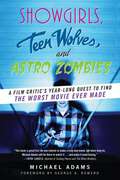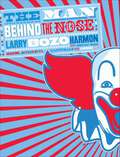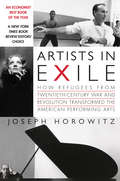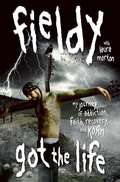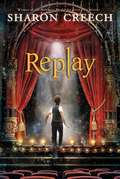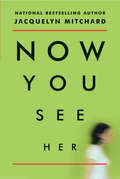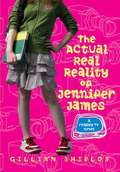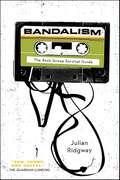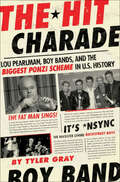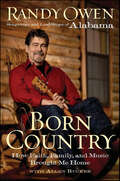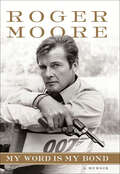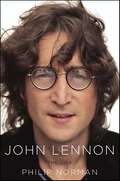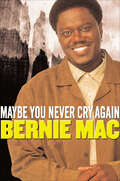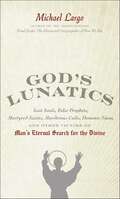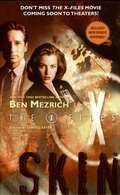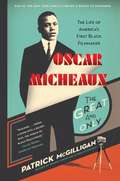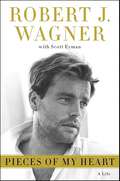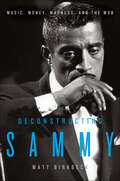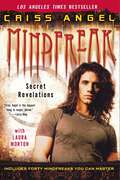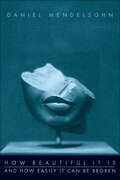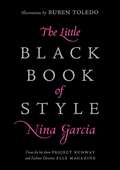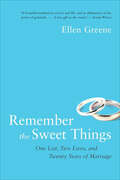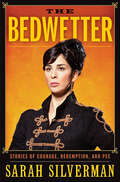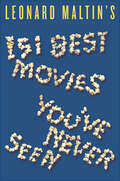- Table View
- List View
Showgirls, Teen Wolves, and Astro Zombies: A Film Critic's Year-Long Quest to Find the Worst Movie Ever Made
by Michael Adams"Michael Adams's book is great fun! No one intends to make a truly bad movie, but when they do, Michael Adams will be there to watch it...and make it entertaining!" —John Landis, director of Trading Places and The Blues Brothers In Showgirls, Teen Wolves, and Astro Zombies, film critic Michael Adams embarks on a year-long odyssey to discover the worst movie ever made, which Mystery Science Theater 3000 star, writer, and director Kevin Murphy calls "disturbingly comprehensive, joyously critical, and the best of its kind." From all-time cult classics such as Reefer Madness and Plan 9 from Outer Space to new entries to the pantheon such as Gigli and Baby Geniuses, no genre, star, or director is safe from Adams’s acerbic wit and hilarious observations. In the vein of A.J. Jacobs’s New York Times bestselling book The Know-It-All, and with the snarky sarcasm of television’s Mystery Science Theater 3000 and The Soup, Showgirls, Teen Wolves, and Astro Zombies leaves no stone unturned. With a foreword by cult director George A. Romero (Night of the Living Dead and Dawn of the Dead).
The Man Behind the Nose: Assassins, Astronauts, Cannibals, and Other Stupendous Yarns
by Larry HarmonThe Man Behind the Nose is the autobiography of the man who was Bozo. For 50 years Larry Harmon was the face—and the nose—of Bozo the Clown, the most well-known, beloved clown of them all, the precursor for every successful modern-day harlequin to come, from Ronald McDonald to Krusty. A warm, surprising, and endlessly entertaining life story filled to the brim with “Assassins, Astronauts, Cannibals, and Other Stupendous Tales,” The Man Behind the Nose is a rollicking ride through the world of a true American icon in greasepaint.
Artists in Exile
by Joseph HorowitzDuring the first half of the twentieth century--decades of war and revolution in Europe--an "intellectual migration" relocated thousands of artists and thinkers to the United States, including some of Europe's supreme performing artists, filmmakers, playwrights, and choreographers. For them, America proved to be both a strange and opportune destination. A "foreign homeland" (Thomas Mann), it would frustrate and confuse, yet afford a clarity of understanding unencumbered by native habit and bias. However inadvertently, the condition of cultural exile would promote acute inquiries into the American experience. What impact did these famous newcomers have on American culture, and how did America affect them? George Balanchine, in collaboration with Stravinsky, famously created an Americanized version of Russian classical ballet. Kurt Weill, schooled in Berlin jazz, composed a Broadway opera. Rouben Mamoulian's revolutionary Broadway productions of Porgy and Bess and Oklahoma! drew upon Russian "total theater." An army of German filmmakers--among them F. W. Murnau, Fritz Lang, Ernst Lubitsch, and Billy Wilder--made Hollywood more edgy and cosmopolitan. Greta Garbo and Marlene Dietrich redefined film sexuality. Erich Korngold upholstered the sound of the movies. Rudolf Serkin inspirationally inculcated dour Germanic canons of musical interpretation. An obscure British organist reinvented himself as "Leopold Stokowski." However, most of these gifted émigrés to the New World found that the freedoms they enjoyed in America diluted rather than amplified their high creative ambitions.A central theme of Joseph Horowitz's study is that Russians uprooted from St. Petersburg became "Americans"--they adapted. Representatives of Germanic culture, by comparison, preached a German cultural bible--they colonized. "The polar extremes," he writes, "were Balanchine, who shed Petipa to invent a New World template for ballet, and the conductor George Szell, who treated his American players as New World Calibans to be taught Mozart and Beethoven." A symbiotic relationship to African American culture is another ongoing motif emerging from Horowitz's survey: the immigrants "bonded with blacks from a shared experience of marginality"; they proved immune to "the growing pains of a young high culture separating from parents and former slaves alike."
Got the Life: My Journey of Addiction, Faith, Recovery, and Korn
by FieldyWhat have you got when you Got the Life? From Korn's legendary bassist comes a no-holds-barred look at the extreme highs and drug-and-booze-fueled lows of the biggest heavy metal band of our era Music was in his bones. From the time he was an infant, Fieldy watched his dad's band perform, and soon enough he found his own calling: the bass. After high school, with a guitar and little else, he left his small California town for the music scene in L.A. Before long, Fieldy, Brian "Head" Welch, James "Munky" Shaffer, drummer David Silveria, and Jonathan Davis would gel together and form a band with a completely new sound-Korn. What happened next was something Fieldy had always dreamed of but was totally unprepared for: Korn exploded, skyrocketing to the top of the charts and fronting the nu metal phenomenon. Fieldy was thrust into the fast-paced, hard-rocking spotlight. Korn began to tour incessantly, creating intense live shows fueled by wild offstage antics. Fieldy became a rock star, and he acted like one, notorious not only for his one-of-a-kind bass lines, but also for his hard-partying, womanizing, bad-boy ways. The more drugs he took, the more booze he drank, the worse he became: He was unfaithful, abusive, mean, and sometimes violent. By all appearances, Fieldy had the life. But he was on the dark path of excess, alienating friends, families, and loved ones, nearly destroying himself and the band. It took an unexpected tragedy to straighten him out: the death of his father, a born-again Christian, to a mysterious illness. Following his father's dying wish, Fieldy found God. Filled with the spirit of his new faith, Fieldy quit drugs and drinking cold turkey, and found the best part of himself. With never-before-seen photos, and never-before-heard stories, Got the Life is raw, candid, and inspiring-the ultimate story of rock and redemption.
Replay
by Sharon CreechLeo's papa stood in the doorway, gazing down at him. "Leo, you make gold from pebbles," and the way he said it, Leo could tell that this was a good thing. He may have been given a bit part in the school play ... but Leo dreams he is the biggest star on Broadway. Sure, his big, noisy family makes him feel like a sardine squashed in a tin ... but in his fantasy he gets all the attention he wants. Yes, his papa seems sad and distracted ... but Leo imagines him as a boy, tap-dancing and singing with delight. That's why they call Leo "fog boy." He's always dreaming, always replaying things in his brain. He fantasizes about who he is in order to discover who he will become. As an actor in the school play, he is poised and ready for the curtain to open. But in the play that is his life, Leo is eager to discover what part will be his.
Now You See Her
by Jacquelyn MitchardFor Hope Shay the entire world is a stage. Really. Acting has been her dream for as long as she can remember. She will do anything, anything, to get a leading role. Okay, maybe faking her own abduction was extreme. But a true actress suffers for her art. And Hope is a born actress if ever there was one.
Now You See Her
by Jacquelyn MitchardFor Hope Shay the entire world is a stage. Really.Acting has been her dream for as long as she can remember. She will do anything, anything, to get a leading role. Okay, maybe faking her own abduction was extreme. But a true actress suffers for her art. And Hope is a born actress if ever there was one.
The Actual Real Reality of Jennifer James
by Gillian ShieldsThis is the diary of Jennifer James. It contains: One Heroine: Jennifer James, burdened by brains, struggling to release her Inner Babe One High School: London Road Comprehensive, a no-hope English school in a no-hope English town One Prize: A scholarship to the elite St. Willibald's College [Jennifer's idea of Paradise] offered to the winner of a tacky reality TV show, Down The Bog and . . . A Thousand Complications: Like Jocasta, the crazy feminist mother; Tallulah, the blond rival from hell; Marcus, the guy with green eyes; and above all, the actual real reality that Jennifer's chances of winning are less than Mega-Zero. . . .
Bandalism: The Rock Group Survival Guide
by Julian RidgwayBandalism [ban-d?l-i-z?m] n .: the willful or malicious destruction of, or damage to, the fabric of a rock/pop/indie group brought about by one or more of its membersAxl Rose's monumental meltdowns . . . Kurt Cobain's tragic band-slaying suicide: The long history of platinum-selling überband implosions is more dramatic than a Russian novel. But even local cover bands can suffer the ill effects of the limelight.Multi-rock-band veteran Julian Ridgway's Bandalism is a can't-miss guide to rock 'n' roll survival, offering sage advice on how to avoid the pitfalls that can doom your group. Here's how to:Find nonpsycho band membersCraft the perfect band imageChoose a name that doesn't suckAnd much more, including the handy Healthy Band Checklist, an ideal MySpace profile generator, and the Second Album Venn Diagram.
The Hit Charade: Lou Pearlman, Boy Bands, and the Biggest Ponzi Scheme in U.S. History
by Tyler GrayJournalist Tyler Gray’s The Hit Charade is the true story of boy band manager Lou Pearlman’s epic rise and fall.Without Lou Pearlman, there would have been no Backstreet Boys, no *NSYNC, and possibly no Justin Timberlake. In the late 1990s, Pearlman’s boy bands ushered out guitar-and-angst-driven grunge music and began to dominate the television and radio airwaves. At the core of this squeaky-clean pop revolution was a sinister international fraud conceived by Pearlman, a huckster who first honed his crooked business skills as a teenage math nerd and blimp enthusiast in Flushing, Queens. From the mid 1980s through 2007, he cheated hundreds of investors out of nearly $500 million. When they finally caught on to him and demanded their money, the “Sixth Backstreet Boy” had already fled to Germany and then to Indonesia, where he was eventually nabbed by authorities and charged with a historic federal fraud.In The Hit Charade, Tyler Gray (the only journalist to speak with Pearlman while he was in jail) weaves together the fascinating behind-the-scenes story of the greedy desperation of this boy-band mogul and monumental scam artist. Gray unravels Pearlman’s twenty-year long Ponzi scheme and explores persistent rumors about alleged inappropriate behavior by Pearlman toward members of the boy bands and other young men. Along the way, former friends, family members, Pearlman business associates, and band members themselves reveal detailed accounts of everything from the heyday of their stardom to Pearlman’s more troubled times.“Lou Pearlman’s schemes were so outlandish they can’t possibly have been real. But Tyler Gray exposes him as one of the most sinister scam artists in history.” —Joe Levy
Born Country: How Faith, Family, and Music Brought Me Home
by Allen Rucker Randy Owen“[Randy Owen] is a true gentleman, armed with an unassuming attitude and a modest approach to life, coupled with enormous fame and success. Born Country is a great read!”—Dick Clark, former host of American BandstandBorn Country is an inspiring memoir of faith, family, and living the American dream from the lead singer/songwriter of Alabama, the biggest country music group of all time. A multiple Grammy, People’s Choice, and Country Music Association Award-winning superstar, Randy Owen tells about growing up poor in rural Alabama, the son of devout Christian sharecroppers, his rise to the top of the charts, his personal trials and the destructive temptations he avoided through his love and unassailable faith in God. Written with Allen Rucker, Randy Owen’s Born Country is both a fascinating look inside the Alabama phenomenon and a moving portrait of an extraordinary life enriched by traditional Christian values
My Word is My Bond: A Memoir
by Roger Moore“Like his James Bond movies . . . Moore’s autobiography . . . [has] a lead character who doesn’t take himself too seriously . . . full of humor.” —New York Post One of the most recognizable big-screen stars of the twentieth century, Sir Roger Moore played the role of James Bond longer than any other actor. Beginning with the classic Live and Let Die, running through Moonraker and A View to a Kill, Moore brought his finely honed wit and wry charm to one of Hollywood’s most beloved and long-lasting characters. Still, James Bond was only one in a lifetime of roles stretching back to Hollywood’s studio era, and encompassing stardom in theater and television on both sides of the Atlantic. From The Saint to Maverick, Warner Brothers to MGM, Hollywood to London to locations the world over, Roger Moore’s story is one of the last of the classic Hollywood lives as yet untold.Until now. From the dying days of the studio system and the birth of television, to the quips of Noël Coward and David Niven, to the bedroom scenes and outtakes from the Bond movies, Moore has seen and heard it all. Nothing is left out—especially the naughty bits. The “special effects” by which James Bond unzipped a dress with a magnet; the spectacular risks in The Spy Who Loved Me’s opening scene—the stories in My Word is My Bond are priceless.Moore hobnobbed with the glamorous and powerful, counting Elizabeth Taylor, Jane Seymour, and Cary Grant among his contemporaries and friends. As much as it is Moore’s own exceptional story, My Word is My Bond is a treasure trove of Hollywood history.“Charming.” —Kirkus Reviews
John Lennon: The Life
by Philip NormanFor more than a quarter century, biographer Philip Norman's internationally bestselling Shout! has been unchallenged as the definitive biography of the Beatles. Now, at last, Norman turns his formidable talent to the Beatle for whom being a Beatle was never enough. Drawing on previously untapped sources, and with unprecedented access to all the major characters, Norman presents the comprehensive and most revealing portrait of John Lennon ever published.This masterly biography takes a fresh and penetrating look at every aspect of Lennon's much-chronicled life, including the songs that have turned him, posthumously, into a near-secular saint. In three years of research, Norman has turned up an extraordinary amount of new information about even the best-known episodes of Lennon folklore—his upbringing by his strict Aunt Mimi; his allegedly wasted school and student days; the evolution of his peerless creative partnership with Paul McCartney; his Beatle-busting love affair with a Japanese performance artist; his forays into painting and literature; his experiments with Transcendental Meditation, primal scream therapy, and drugs. The book's numerous key informants and interviewees include Sir Paul McCartney, Sir George Martin, Sean Lennon—whose moving reminiscence reveals his father as never seen before—and Yoko Ono, who speaks with sometimes shocking candor about the inner workings of her marriage to John.“[A] haunting, mammoth, terrific piece of work.” -New York Times Honest and unflinching, as John himself would wish, Norman gives us the whole man in all his endless contradictions—tough and cynical, hilariously funny but also naive, vulnerable and insecure—and reveals how the mother who gave him away as a toddler haunted his mind and his music for the rest of his days.
Maybe You Never Cry Again
by Bernie Mac“Entertainingly tells the life story of one of today's top comedians . . . an uplifting-and humorous-rags to riches story, told with heart.” —Publishers WeeklyBy the tender age of five, Bernie Mac had found his calling: making others laugh. He has since become the star and cocreator of Fox’s hit sitcom The Bernie Mac Show; a stand-up legend; and a hit movie star in Head of State and Charlie’s Angels: Full Throttle. Now this amazing comedian delves deep down inside to retell the poignant and hilarious story of his childhood and the people who helped shape him into the comedian—and the strong and self-reliant man—he is today.When young Bernie Mac lost his beloved mother to breast cancer, and faced an astounding number of other hardships, he remembered the “Mac-isms” she taught him: You have to meet all of the challenges, big and small. Because how you start is how you finish. If you want a helping hand, look at the end of your arm. These tough-love lessons gave him an inner strength that led him to choose hope over despair, and to follow his dreams. Maybe You Never Cry Again is a powerful testament to how a mother’s love made everything possible for Bernie Mac by teaching him to believe in himself.
God's Lunatics: Lost Souls, False Prophets, Martyred Saints, Murderous Cults, Demonic Nuns, and Other Victims of Man's Eternal Search for the Divine
by Michael LargoGod’s Lunatics is an eyebrow-raising encyclopedia of the strange and shocking side of history’s religions, cults, and spiritual movements, by Michael Largo, the bestselling author of the Bram Stoker Award-winning Final Exits. A fascinating compendium of “Lost Souls, False Prophets, Martyred Saints, Murderous Cults, Demonic Nuns, and Other Victims of Man’s Eternal Search for the Divine,” God’s Lunatics contains a wealth of valuable extreme spiritual information—including the number of exorcisms performed each year and the proper method for identifying the Antichrist.
The X-Files: Skin
by Ben MezrichWhen moonlighting medical students "harvesting" skin from a corpse for temporary use accidentally take it from the wrong donor, the results are catastrophic: a New York City hospital ward is destroyed in a bloodbath, and an elderly professor, admitted for a routine skin graft, is suddenly the city's most wanted fugitive.Agents Fox Mulder and Dana Scully are the only ones to suspect something more ominous than a medical procedure gone awry. As the FBI agents investigating the "X-Files"--strange and inexplicable cases the Bureau wants to keep hidden--Mulder and Scully are determined to track down the forces they suspect are behind the murderer.While the police hunt the fleeing professor, Mulder and Scully track the skin that was grafted onto him, a trail that leads from the morgue to the headquarters of a cutting-edge biotech company to the jungles of Thailand. Together they begin to uncover an unholy and totally deniable alliance between a battle-trained plastic surgeon, international politicians, and a legendary Thai monster known as the "Skin-Eater."
Oscar Micheaux: The Great and Only
by Patrick McgilliganOscar Micheaux was the Jackie Robinson of film, the black D. W. Griffith: a bigger-than-life American folk hero whose important life story is nearly forgotten today. Now, in a feat of historical investigation and vivid storytelling, one of our greatest film biographers takes on one of the most talented and complex figures in the history of American entertainment. The son of freed slaves, Micheaux grew up in Metropolis, Illinois, then roamed America as a Pullman porter before making his first mark as a homesteader in South Dakota. Disaster and defeat there led him to forge a career publishing a successful series of autobiographical novels. Ever the entrepreneur, when Hollywood failed to bid high enough for film rights to his stories, he answered by forming his own film production company. Going on to produce or direct twenty-two silent and fifteen sound films in his lifetime, Micheaux became the king of the "race cinema" industry at a time when black-produced films had to scrounge for venues in a segregated society. In this groundbreaking new biography, award-winning film historian Patrick McGilligan offers a vivid and fascinating portrait of this little-known pioneer. Part visionary, part raffish Barnum-like showman, Micheaux was both a maverick filmmaker and an inveterate hustler who used every weapon at his disposal to break the color barrier and thrive in a profession he helped to invent. He made a fortune and lost it again, and launched repeated con games that were followed by public arrests and bankruptcies. He eagerly took credit for the work of others-including his unsung-heroine wife. In his desperate later years, he even sunk to plagiarizing his final novel-a discovery McGilligan reveals here for the first time. In this searching exploration, McGilligan tracks down long-lost financial records, unpublished letters, and unmarked pauper's graves, pinpointing Micheaux's birthplace, his tangled personal life, and the circumstances of his tragic death. The result is an epic that bridges a fascinating period in American history, and offers lessons for anyone who would understand the role of black America in forming the culture of our time.
Pieces of My Heart: A Life
by Robert J. Wagner Scott EymanThe Hollywood icon tells about his rise to Hollywood stardom among legends like Cary Grant and Barbara Stanwyck and his troubled marriage, divorce, and remarriage to starlet Natalie Wood.In the revelation-filled memoir from one of Hollywood’s most talented actors, readers have a candid and deeply personal look at the life and career of Robert Wagner. Wagner’s long career began in the Hollywood of the 1950s, when studios were dominant and even the love lives of actors were dictated by what benefited the studio. His memoirs will chronicle in a very personal way his rise to stardom, his decline, and his resurrection. Wagner will talk candidly about his famous relationship with Natalie Wood and the circumstances surrounding her tragic death. His friendships and stories include major Hollywood personalities in the last half of the 20th century.When his family moved to Los Angeles, a young Wagner held a variety of jobs (including one as a caddy for Clark Gable) while pursuing his goal, but it was while dining with his parents at a restaurant in Beverly Hills that he was “discovered” by a talent scout.Known as much for his on-screen abilities as his off-screen personal heartbreak, Wagner will discuss for the first time his complicated and ultimately tragic relationship with Hollywood sweetheart Natalie Wood. It was implied that Wagner played a role in Natalie Wood’s tragic drowning off the coast of Catalina Island in 1981 and Wagner, for the first time ever, will set the record straight.With at least two dozen photos to illustrate his real Hollywood-style tell-all, this will be the extremely candid autobiography of Robert Wagner.
Deconstructing Sammy: Music, Money, and Madness
by Matt BirkbeckSammy Davis Jr. lived a storied life. Adored by millions over a six-decade-long career, he was considered an entertainment icon and a national treasure. But despite lifetime earnings that topped $50 million, Sammy died in 1990 near bankruptcy. His estate was declared insolvent, and there was no possibility of itever using Sammy's name or likeness again. It was as if Sammy had never existed. Years later his wife, Altovise, a once-vivacious woman and heir to one of the greatest entertainment legacies of the twentieth century, was living in poverty, and with nowhere else to go, she turned to a former federal prosecutor, Albert "Sonny" Murray, to make one last attempt to resolve Sammy's debts, restore his estate, and revive his legacy. For seven years Sonny probed Sammy's life to understand how someone of great notoriety and wealth could have lost everything, and in the process he came to understand Sammy as a man whose complexity makes for a riveting work of celebrity biography as cultural history.Matt Birkbeck's serious work of investigative journalism unveils the extraordinary story of an international celebrity at the center of a confluence of entertainment, politics, and organized crime, and shows how even Sammy's outsized talent couldn't save him from himself.
Mindfreak: Secret Revelations
by Laura Morton Criss AngelA Los Angeles Times bestseller, Mindfreak: Secret Revelations is the spellbinding memoir of stage and television’s master magician—Criss Angel.The star of Mindfreak—the most astonishing and provocative mystifier of the twenty-first century—Criss Angel shares his philosophy of life and magic, goes behind the scenes of his groundbreaking A&E TV series, and reveals the secrets to forty mind-blowing illusions that you can master!“An amazing illusionist. The best I’ve ever seen.” —Howard Stern“I don’t think there is anyone in magic right now who has captured the public interest more than Criss Angel.” —Penn Jillette“Criss Angel is the biggest thing in magic, period.” —Larry King“Criss Angel—part Cirque de Soleil freak, part magician, part street performance artist, part musician, part dancer—has taken magic and illusion from the realm of cheesola to the realm of art.” —New York Post
How Beautiful It Is And How Easily It Can Be Broken: Essays
by Daniel MendelsohnThe New York Times–bestselling critic uses his training as a classicist to tackle contemporary films, theater, literature, and more in 30 elegant essays.Whether he’s on Broadway or at the movies, considering a new bestseller or revisiting a literary classic, Daniel Mendelsohn’s judgments over the past fifteen years have provoked and dazzled with their deep erudition, disarming emotionality, and tart wit. Now How Beautiful It Is and How Easily It Can Be Broken reveals all at once the enormous stature of Mendelsohn’s achievement and demonstrates why he is considered one of our greatest critics. Writing with a lively intelligence and arresting originality, he brings his distinctive combination of scholarly rigor and conversational ease to bear across eras, cultures, and genres, from Roman games to video games.His interpretations of our most talked-about films—from the work of Pedro Almodóvar to Brokeback Mountain, from United 93 and World Trade Center to 300, Marie Antoinette, and The Hours—have sparked debate and changed the way we watch movies. Just as stunning and influential are his dispatches on theater and literature, from The Producers to Jeffrey Eugenides' Middlesex, from The Lovely Bones to the works of Harold Pinter. Together these thirty brilliant and engaging essays passionately articulate the themes that have made Daniel Mendelsohn a crucial voice in today’s cultural conversation: the aesthetic and indeed political dangers of imposing contemporary attitudes on the great classics; the ruinous effect of sentimentality on the national consciousness in the post-9/11 world; the vital importance of the great literature of the past for a meaningful life in the present.How Beautiful It Is and How Easily It Can Be Broken makes it clear that no other contemporary thinker is as engaged with as many aspects of our culture and its influences as Mendelsohn is, and no one practices the vanishing art of popular criticism with more acuity, humor, and feeling.Praise for How Beautiful It Is and How Easily It Can Be Broken “These essays richly repay the time readers spend in their company.” —Publishers Weekly (starred review)“Like fine banquet fare: Some items to be wolfed down, some savored slowly, some best stored in the fridge for a later day.” —Kirkus Reviews
The Little Black Book of Style
by Nina GarciaFrom Nina Garcia—fashion judge on Bravo’s hit Project Runway and author of Style Strategy and The One Hundred—comes her wildly popular New York Times bestseller The Little Black Book of Style. Here, in one indispensible volume, are Nina’s ultimate rules of style to help you uncover your own signature look.Every time you dress, you assert your identity. With style, you tell the world your story. In that way, style affords you opportunities to think about your appearance as a quality of your creative character. The Little Black Book of Style helps you to explore your own fashion voice—the piece of you that joyously revels in the glamorous experience of creating your best self. From cultivating good taste to guarding against definite fashion faux pas, Nina Garcia offers readers the ultimate guide to follow when it comes to dressing their best. Including tips on how and when to wear an outfit, occasion-appropriate wear, advice on how to combine colors and textures, and inspiration on how to achieve your own signature look, you learn how to experiment, storyboard, archive, and play. Timeless and universal, this book seeks to remind women that eternal style is internal style, and that everyone has what it takes to discover themselves through the colorful palette that is fashion.
Remember the Sweet Things: One List, Two Lives, and Twenty Years of Marriage
by Ellen GreeneFor twenty years, Ellen Greene kept a running list of the thoughtful, funny, touching things that her husband, Marsh, said and did. She wrote them down secretly, then shared them with him every Valentine’s Day when he would find pages from her “Sweet Things List” tucked inside a card. A lovely and poignant tribute to a man and a marriage, written with grace and candor, Remember the Sweet Things captures the kindness, sharing, humor, and affection that defined the Greenes’ union and encourages us to acknowledge the goodness in our own lives and relationships.
The Bedwetter: Stories of Courage, Redemption, and Pee
by Sarah SilvermanFrom the outrageously filthy and oddly innocent comedienne and star of the powerful 2015 film I Smile Back Sarah Silverman comes a memoir—her first book—that is at once shockingly personal, surprisingly poignant, and still pee-in-your-pants funny. In this collection of humorous essays, Sarah Silverman tells tales of growing up Jewish in New Hampshire, losing her virginity, learning to curse at 3 years old, and being a bedwetter until she was old enough to drive, and in a surprisingly poignant piece, she recounts the accidental death of her infant brother. Of course, in her loopy, taboo-breaking way, she always manages somehow to leave you laughing. But then you’d expect nothing less from a woman who sang to her boyfriend on national television that she was “F***ing Matt Damon.”If you like Sarah’s television show The Sarah Silverman Program, or memoirs such as Chelsea Handler’s Are You There Vodka? It’s Me Chelsea and Artie Lange’s Too Fat to Fish, you’ll love The Bedwetter.
Leonard Maltin's 151 Best Movies You've Never Seen
by Leonard MaltinWhat 151 movies have you never seen—but should?What French film could teach Hollywood how to make a smart, sexy romantic comedy? (page 233)Where will you find a female-centric Western with a gender-bending protagonist? (page 10)What film won a Special Jury Prize at Sundance and then fell off the radar? (page 261)What farcical comedy includes such real-life characters as Richard Nixon and Henry Kissinger? (page 50)In what unsung comedy will you find Michael Douglas giving his all-time best performance? (page 130)What debut film from the director of The Dark Knight creates palpable chills—despite a shoestring budget and a no-name cast? (page 79)What John Wayne movie was out of circulation for thirty years—and still qualifies as a sleeper? (page 121)What terrific Heath Ledger movie was released the same month as Brokeback Mountain—and flopped? (page 26)What clever modern-day film noir was made for just half a million dollars? (page 18)What captivating film stars one of the seminal artists of the twentieth century? (page 203)
